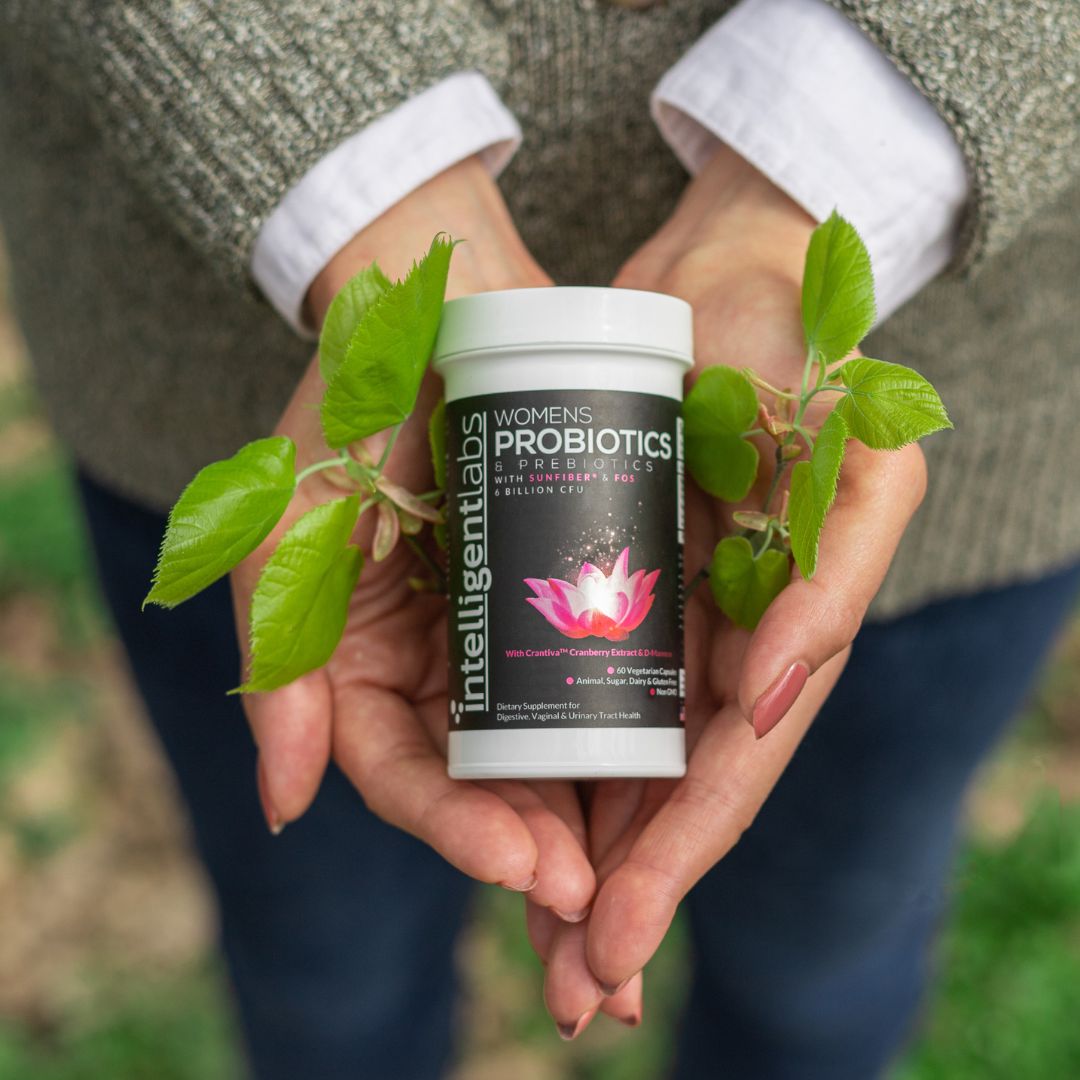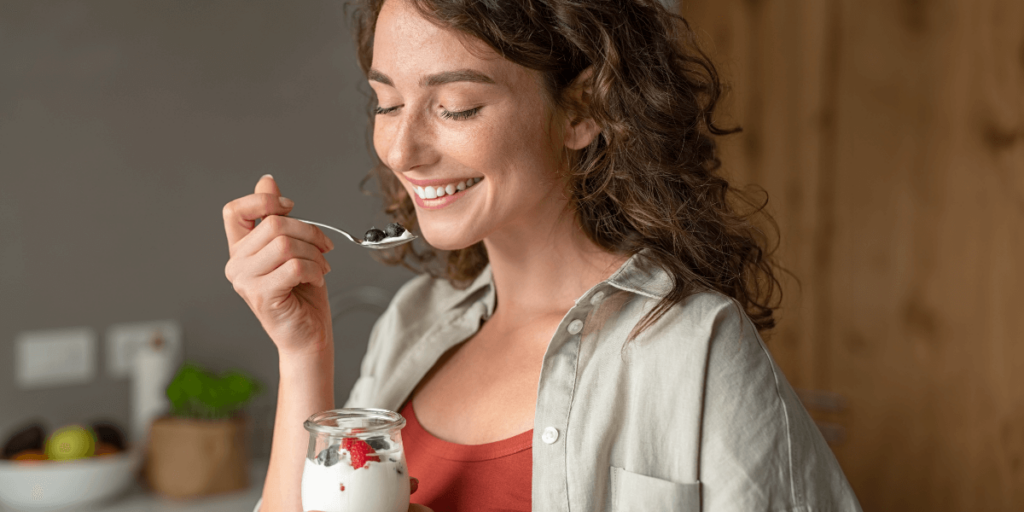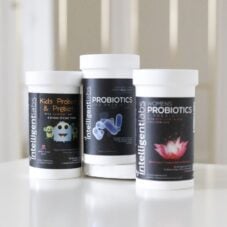Probiotics
Female Probiotics: How To Choose The Best Probiotics For Women?
Reproductive differences in men and women are a given. But did you know that even female digestive systems are different from males? Even so, everyone can benefit from taking probiotics. These are the “good” bacteria that help with gut health. But why should women choose “female” probiotics over “regular” probiotics? And what are the criteria for choosing the best probiotics for women? Read on to find out!
Table of Contents
Are female probiotics really that different from regular adult probiotics?
Okay, so before we answer the question, let’s define what these two terms mean:
- Female/women’s probiotics are specifically made for women to promote feminine health. An example would be our Women’s Probiotics & Prebiotics.
- Regular/adult probiotics are marketed for all adults of any gender. An example would be our Adult Probiotics & Prebiotics.
Female probiotics typically contain additional ingredients. They may help maintain the general health of the vaginal microbiome.

For example, our Women’s Probiotics features the following ingredients:
- 4 strains of patented bacterial strains sourced from Dupont Danisco
- 2 types of prebiotic fiber to serve as food for the probiotics
- Crantiva™ Cranberry juice powder, and
- D-mannose powder
The first two ingredients help support gut health (1). The last two help maintain balance “down there”. Both D-Mannose and cranberry help remove bacteria, yeasts, and other microorganisms from the urinary tract (2, 3).
Female probiotics may be helpful for ladies who suffer from frequent gut issues. Also, those who want to prevent candidiasis, bacterial vaginosis, and other urinary tract infections may benefit from taking our product.
Related article: The Best Supplements and Wellness Products For Women
7 Tips To Choose The Best Probiotics For Women
Here are our tips to help you identify the best female probiotics on the market:
1) The quality of probiotic strains used
By quality, we mean patented strains. After all, there are thousands of probiotic strains out there, many of them not patented (4). Choose strains that have been studied for their benefits.
So, a patented strain’s name has 3 elements – the genus, species, and strain number.
Here’s an example – Lactobacillus acidophilus La-14
Lactobacillus is the genus. Acidophilus is the species. La-14 is the strain number.
For our Intelligent Labs Women’s Probiotics, we use 4 patented strains known for their benefits on the gut and feminine health. These are L. acidophilus La-14®, B. lactis Bl-04®, B. bifidum Bb-06®, and B. longum Bl-05®.
These are human strains (not soil-based) known for being acid- and bile-resistant. They can survive the harsh gut environment and thrive and reproduce there. The last thing you want is for the probiotics to die long before they do any work in your gut. That would be a waste of money!
2) Check the probiotic strength
Probiotic strength is measured in colony forming units (CFU). CFU refers to the number of viable bacteria colonies that can settle in the gut and multiply.
The best female probiotic should indicate billions of CFU on the label, not millions. Each capsule of our Women’s Probiotics contains 6 Billion CFU. This is a good strength for daily gut health support.
Also, the CFU on the label should last until the product’s expiry. This is important because the probiotics can die over time. If the product label says 6 Billion CFU, then that number should remain the same before expiry.
3) The best female probiotics should include prebiotics

Many probiotics supplements have an expiration date at around the 2-year mark. To help ensure survival until expiry, the probiotics are put to “sleep” when they’re placed inside the capsules. However, they may wake up any time before they’re ingested.
Adding prebiotics (or fibers) helps ensure that if the probiotics do wake up, they have something to sustain them. This is known as synbiotics (5).
For our Women’s Probiotics, we don’t just include one type of prebiotic – we include two types! These are FOS and Sunfiber®. That’s plenty of fiber for the good bacteria to munch on!
4) Science-backed ingredients to support feminine health
Many brands add various ingredients to their products, depending on the health benefits they want users to enjoy. For example, in addition to the probiotics, they may add cranberry, D-mannose, cherry, apple cider, berry, lavender, etc.
For our Women’s Probiotics, we add a special blend of cranberry powder and D-mannose powder. These two ingredients have been shown to be effective in preventing urinary tract infections.
Cranberry powder may help remove bacteria, fungi, and other microbes from the urinary tract (2).
D-mannose is a type of sugar similar to glucose. It’s found in the human body and in some plants too. It may also help get rid of the bacteria that cause UTIs (3).
5) Choose shelf-stable probiotics
A shelf-stable product is the best choice as it requires no refrigeration. There’s always the possibility that the product may be exposed to light and heat. Unfortunately, these factors can kill the probiotics. They’re very fragile, so they must be protected.
A perfect example of a shelf-stable product is our Women’s Probiotics. We use an Activ-Polymer™ bottle that features an impenetrable desiccant sleeve. This significantly helps reduce their exposure to moisture, heat, and light.
Moreover, we add an Oxyfree® desiccant to absorb any oxygen. It also helps to remove any residual moisture from inside the bottle. This helps reduce oxygen levels to 0.01% for the product’s lifespan!
6) The best probiotics for women use delayed-release capsules
The next must-have factor in a female probiotic is the type of capsules used.
We use delayed-release capsules for our Women’s Probiotics. These capsules protect the good bacteria from stomach acid. They also help ensure the probiotics make it to the gut alive. Moreover, they’re vegetarian capsules too!
7) Choose a third-party tested female probiotic
It’s easy for a company to make claims about its product. It’s therefore a good idea to choose products with third-party testing certificates. They help corroborate and verify the company’s claims. That said, our Women’s Probiotics certificate is available upon request.
Can pregnant and breastfeeding women take female probiotics?
Probiotics are generally considered safe, even for pregnant and breastfeeding moms. After all, probiotics are part of our digestive system; they’re a part of us (6)!
In fact, exclusively breastfed babies have a predominance of these good bacteria. Studies also show that human milk even contains ready-made prebiotics (7). Nevertheless, we highly suggest you consult your doctor before taking probiotics.
Conclusion
To sum up, ladies keen on maintaining their vaginal, urinary, and gut health should take our Women’s Probiotics & Prebiotics. The cranberry and D-mannose definitely give it an edge over other products. Give it a try today!
💬 Something on your mind? Share your thoughts in the comments. We love hearing from curious minds.
📩 And while you’re here, join our newsletter for more smart stuff (and secret perks)!
References
(1) Bertuccini L, Russo R, Iosi F, Superti F. Effects of Lactobacillus rhamnosus and Lactobacillus acidophilus on bacterial vaginal pathogens. Int J Immunopathol Pharmacol. 2017;30(2):163-167. doi:10.1177/0394632017697987
(2) González de Llano D, Moreno-Arribas MV, Bartolomé B. Cranberry Polyphenols and Prevention against Urinary Tract Infections: Relevant Considerations. Molecules. 2020 Aug 1;25(15):3523. doi: 10.3390/molecules25153523. PMID: 32752183; PMCID: PMC7436188.
(3) Wagenlehner F, Lorenz H, Ewald O, Gerke P. Why d-Mannose May Be as Efficient as Antibiotics in the Treatment of Acute Uncomplicated Lower Urinary Tract Infections-Preliminary Considerations and Conclusions from a Non-Interventional Study. Antibiotics (Basel). 2022 Feb 25;11(3):314. doi: 10.3390/antibiotics11030314. PMID: 35326777; PMCID: PMC8944421.
(4) Bacterial Type Strains, August 24, 2022 | Shahin Ali, PhD, and Cara Wilder, PhD, ELS
(5) Synbiotics from wikipedia, https://en.wikipedia.org/wiki/Synbiotics
(6) Thursby E, Juge N. Introduction to the human gut microbiota. Biochem J. 2017 May 16;474(11):1823-1836. doi: 10.1042/BCJ20160510. PMID: 28512250; PMCID: PMC5433529.
(7) Notarbartolo V, Giuffrè M, Montante C, Corsello G, Carta M. Composition of Human Breast Milk Microbiota and Its Role in Children’s Health. Pediatr Gastroenterol Hepatol Nutr. 2022 May;25(3):194-210. doi: 10.5223/pghn.2022.25.3.194. Epub 2022 May 9. PMID: 35611376; PMCID: PMC9110848.




